Do you keep an aloe plant in your kitchen? Aloe is an incredible plant with a wide range of benefits — most people know the aloe plant simply as something that's used to treat sunburn. However, Aloe vera has been used for thousands of years to remediate a plethora of issues.
Aloe is an easy plant to keep — it's easily recognizable with it's rosette pattern of long, fleshy leaves and as a succulent it has a natural capacity for water storage. This means it requires minimal attention and is easy to keep healthy.
If you should ever burn yourself in the kitchen, simply break off a stem and apply the open flesh of the plant to the burn, squeezing or crushing the leaf if necessary. Aloe has an amazing ability to heal burns quickly. The broken leaf won't grow back, but this hardy plant will soon produce plenty more leaves.
Aloe's ability to heal burns is just one of the many uses of this amazing plant. It's use for medicinal purposes can be documented as far back as the Mesopotamians, almost 4000 years ago, where both Ancient Egyptians and Greeks relied upon this plant regularly.
Why has Aloe proven so popular through the ages? Aloe is an antibacterial plant and it also has laxative, purgative, stimulant and tonic qualities as well. It's a powerful antibacterial and antifungal agent and is therefore frequently used to treat internal disorders such as peptic ulcers, gastrointestinal infections, digestive disorders and constipation.
Externally, it's powers go way beyond first aid for kitchen burns. It provides a soothing effect for all sorts of minor skin irritations and is used in a wide variety of pharmaceuticals, cosmetics and dermalogical products.
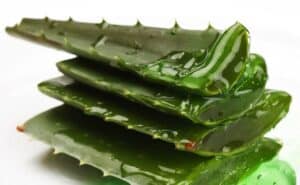 As with many natural remedies, there is not simply one ingredient that makes Aloe so effective. Aloe contains a variety of vitamins, minerals, amino acids and other trace elements all perfectly balanced to work together in a way that allows the body to utilize them effectively for its own healing and repair. Just recently science has discovered natural components of aloe referred to as glyconutrients that have a profound impact on the immune system. Tens of thousands drink Aloe vera juice regularly and with good reasons as listed below.
As with many natural remedies, there is not simply one ingredient that makes Aloe so effective. Aloe contains a variety of vitamins, minerals, amino acids and other trace elements all perfectly balanced to work together in a way that allows the body to utilize them effectively for its own healing and repair. Just recently science has discovered natural components of aloe referred to as glyconutrients that have a profound impact on the immune system. Tens of thousands drink Aloe vera juice regularly and with good reasons as listed below.
Detoxification: With its rich mix of vitamins, minerals and trace elements, Aloe vera juice is a potent natural aid for detoxification and is a powerful adjunct for cleansing the entire system.
Healthy Digestion: Aloe can help decrease the amount of unfriendly bacteria and yeast in the gut and is credited with improving bowel regularity, increasing protein absorption, and reducing the symptoms of heartburn and other digestive problems.
Immune Support: The anti-oxidants in aloe can help neutralize free radicals and boost the immune system.
Reduce Inflammation: With at least twelve different compounds known to reduce or inhibit inflammation, aloe can be quite effective for those with stiff, swollen or painful joints.
Key Vitamins and Minerals: Aloe vera is packed with vitamins and minerals. It contains Vitamins A, B1, B2, B6, B12, C, E, Folic Acid and Niacin. In addition it also contains a variety of minerals including Calcium, Sodium, Iron, Potassium, Copper, Zinc, Manganese, Magnesium, Chromium and more.
Amino Acid Supplementation: The human body requires 20 amino acids to build and restore muscle tissue, eight of which are termed 'essential' because the body can't make them itself. Aloe vera contains 19 amino acids, including seven of the eight essential amino acids.
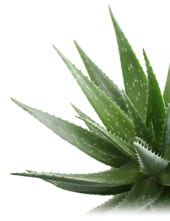 While an aloe vera plant is an important addition to the first aid kit for your kitchen, its natural properties and benefits provide so much more. Even though Aloe vera juice has a somewhat bitter flavour, it can be artfully disguised to give delicious vegetarian recipes a most powerful nutritional punch. Aloe vera juice can be used in smoothies, juicing recipes and salad dressings, just to name a few. Whatever the choice is for use, Aloe vera should be a part of everyone's kitchen arsenal.
While an aloe vera plant is an important addition to the first aid kit for your kitchen, its natural properties and benefits provide so much more. Even though Aloe vera juice has a somewhat bitter flavour, it can be artfully disguised to give delicious vegetarian recipes a most powerful nutritional punch. Aloe vera juice can be used in smoothies, juicing recipes and salad dressings, just to name a few. Whatever the choice is for use, Aloe vera should be a part of everyone's kitchen arsenal.
Dr. Linda Kennedy MS SLP ND is an avid animal activist and nature lover. She owns a 10,000 square foot state of the art nutritional laboratory where she produces nutritional health supplements that are free of animal products.
- For more tips on plant-based nutrition, make sure to browse VegKitchen’s Nutrition page.
- For lots more features on healthy lifestyle, please explore VegKitchen’s Healthy Vegan Kitchen page.



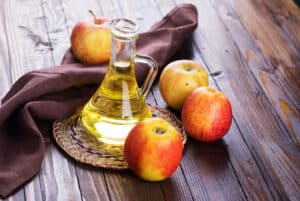
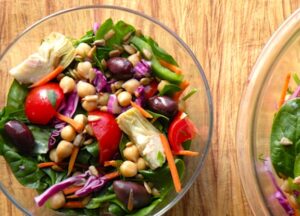
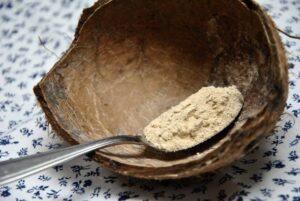
Aloe Vera For Hair says
Nice article, you are right, aloe vera is fantastic for burns. I always have some aloe vera gel handy, would be pretty cool to have a plant though to have it in it's natural form.
Barbara Pollak says
My husband killed mine by overwatering it when I was out of town 🙁
But it was wonderful when I had it!
Bridget says
Can't wait to try aloe vera in the kitchen!
Abigail says
I used my aloe for my eczema - really helps my dry and cracked skin, especially in the colder months!
Emily Stone says
The aloe vera plant is one of the most powerful and well-known medicinal plants, It has been used for more than 5,000 years due to its healing and nurturing effects it has on the skin.